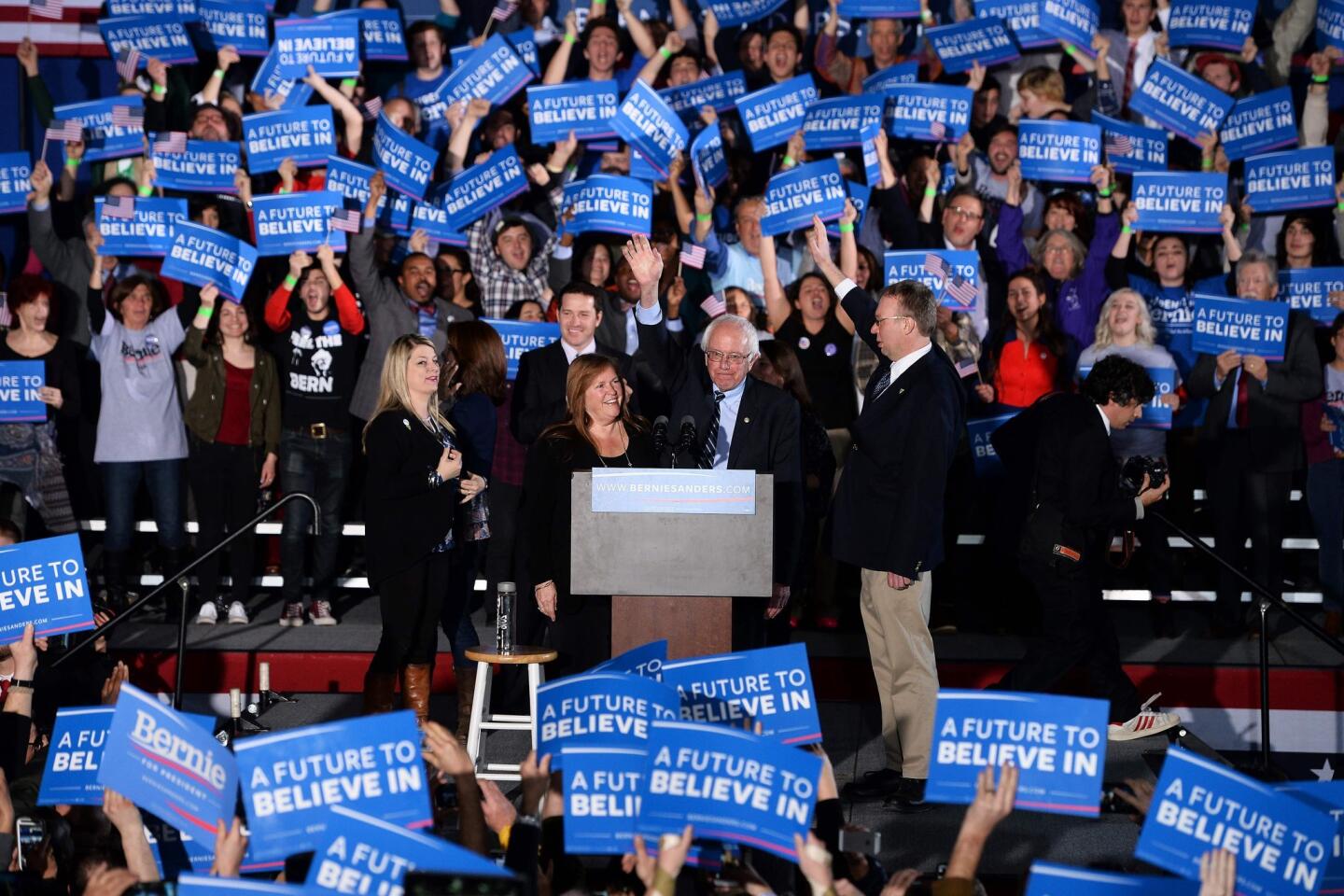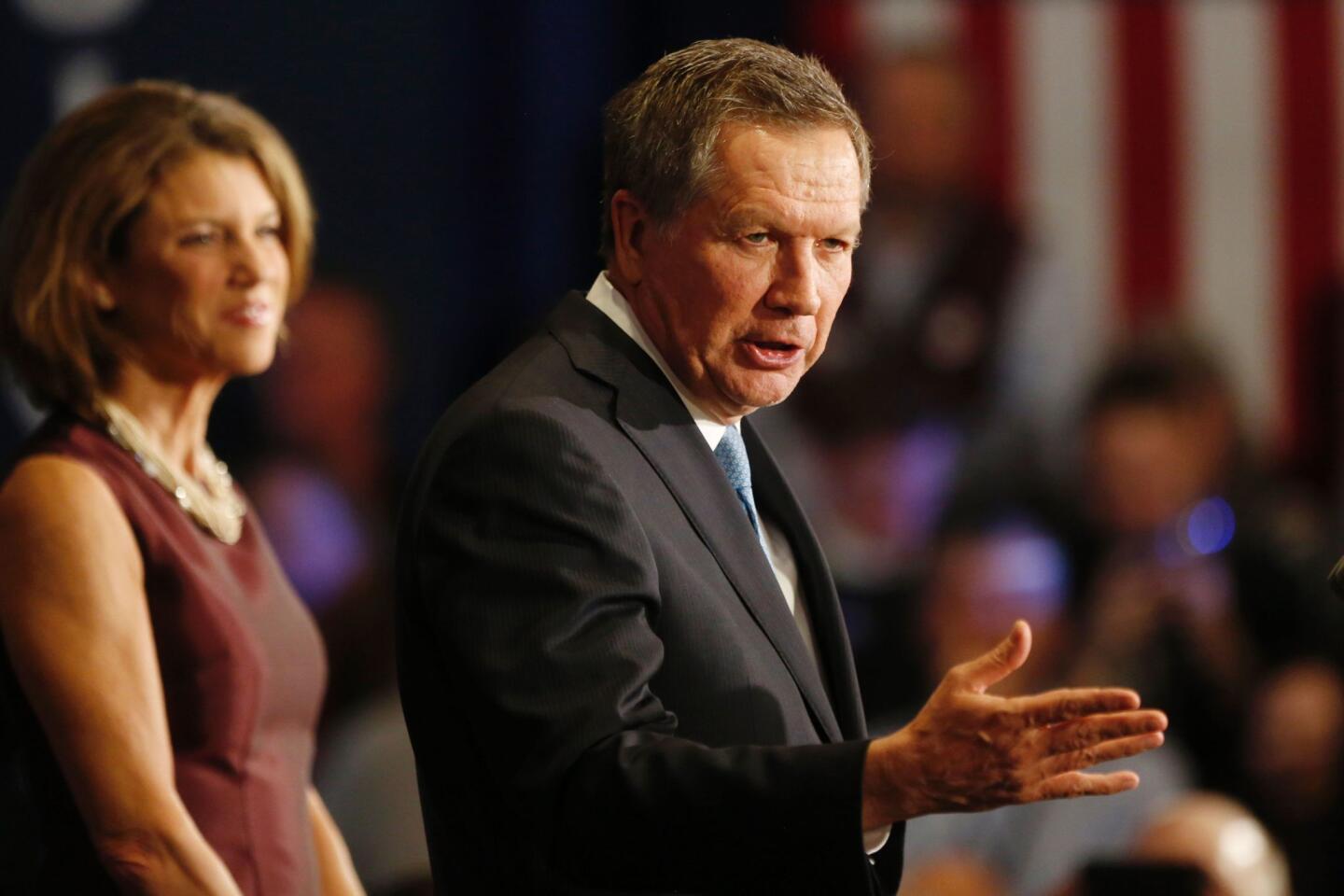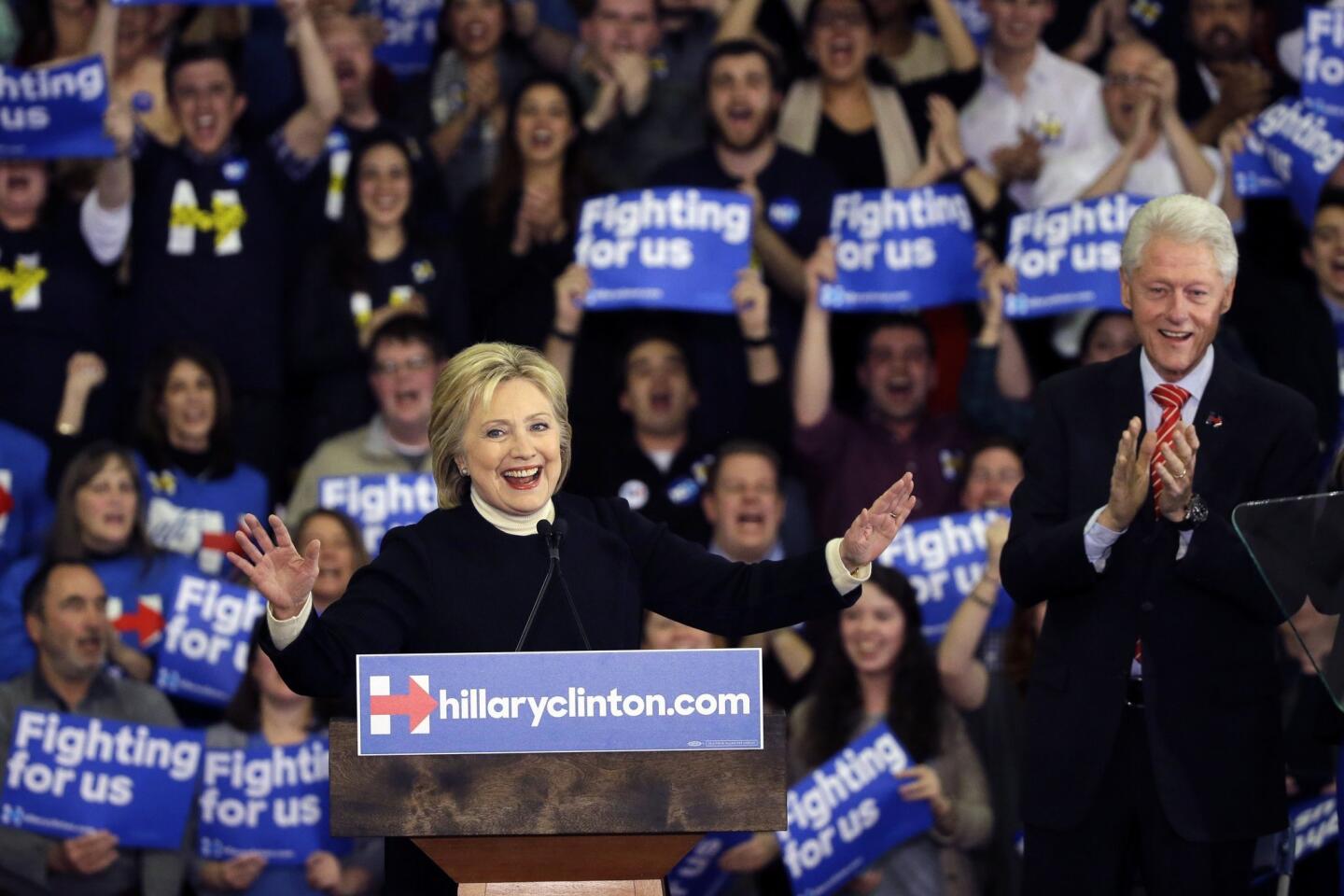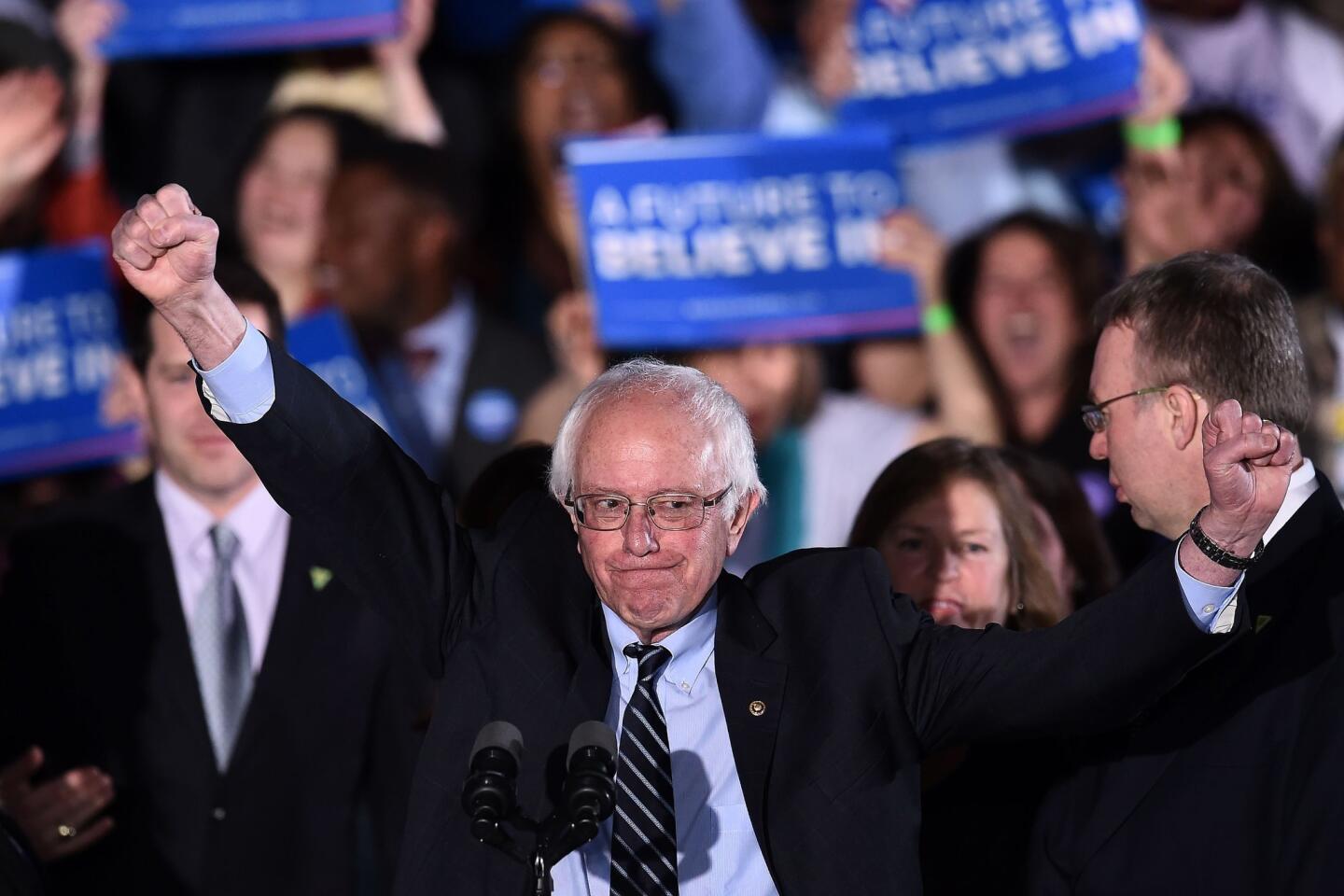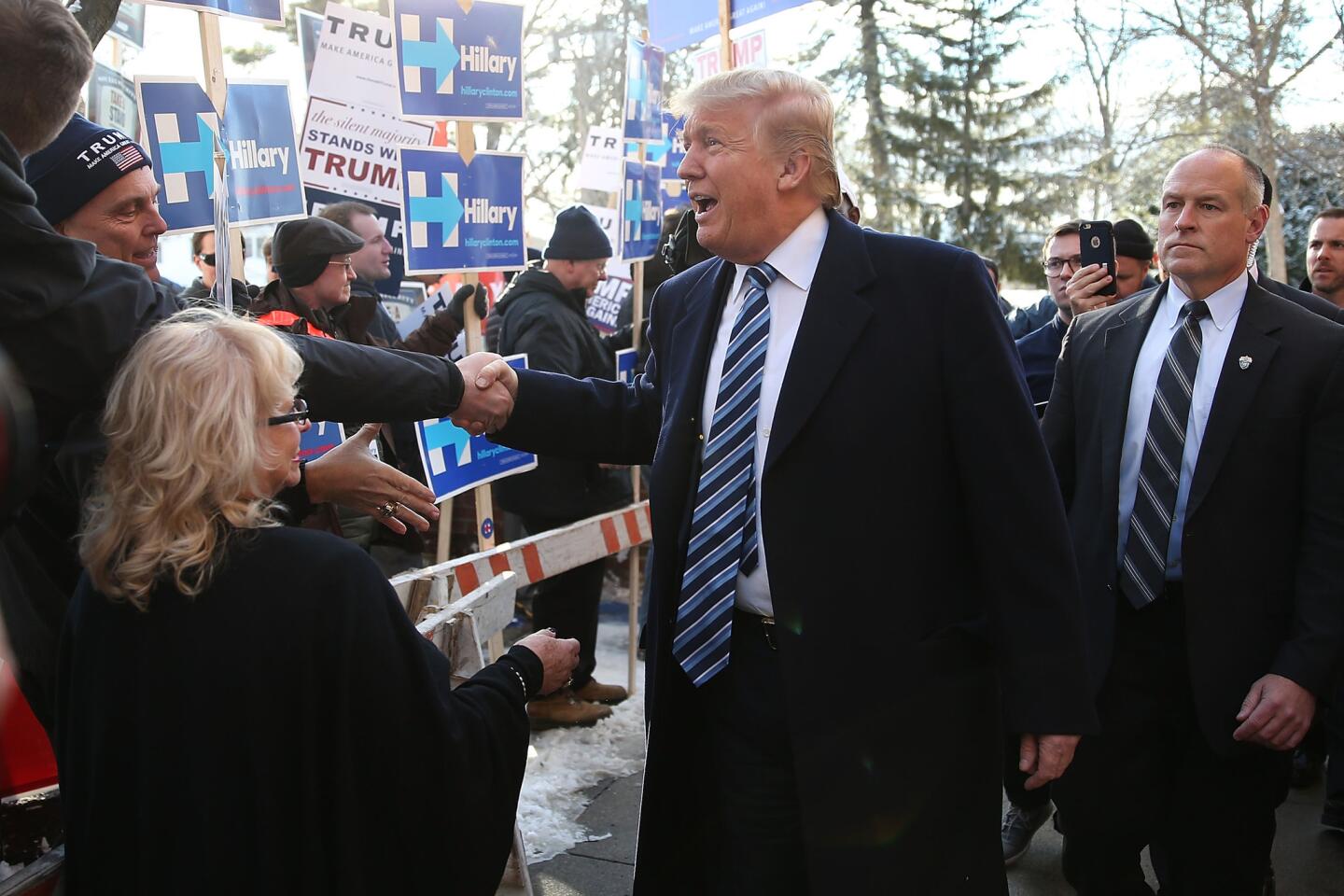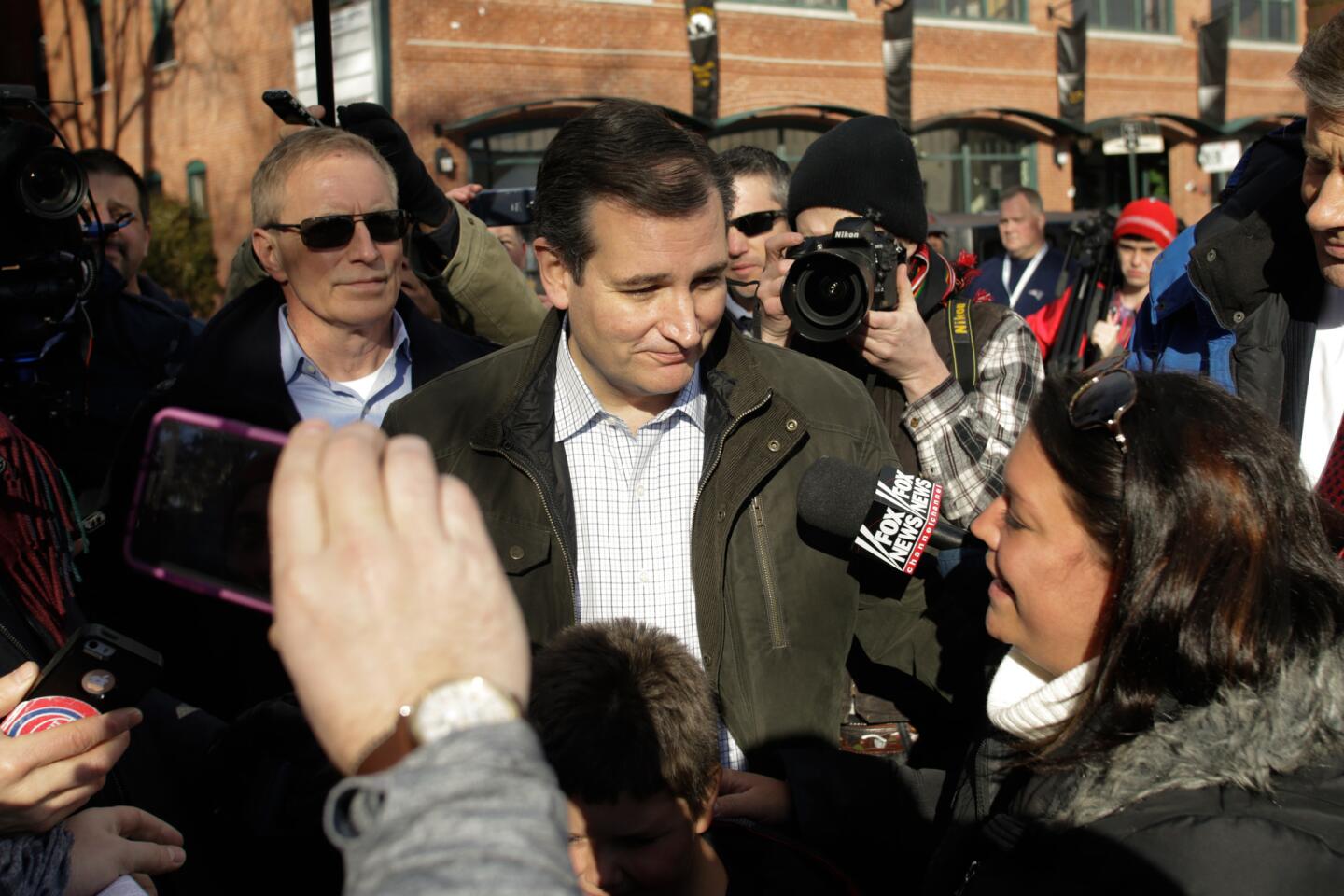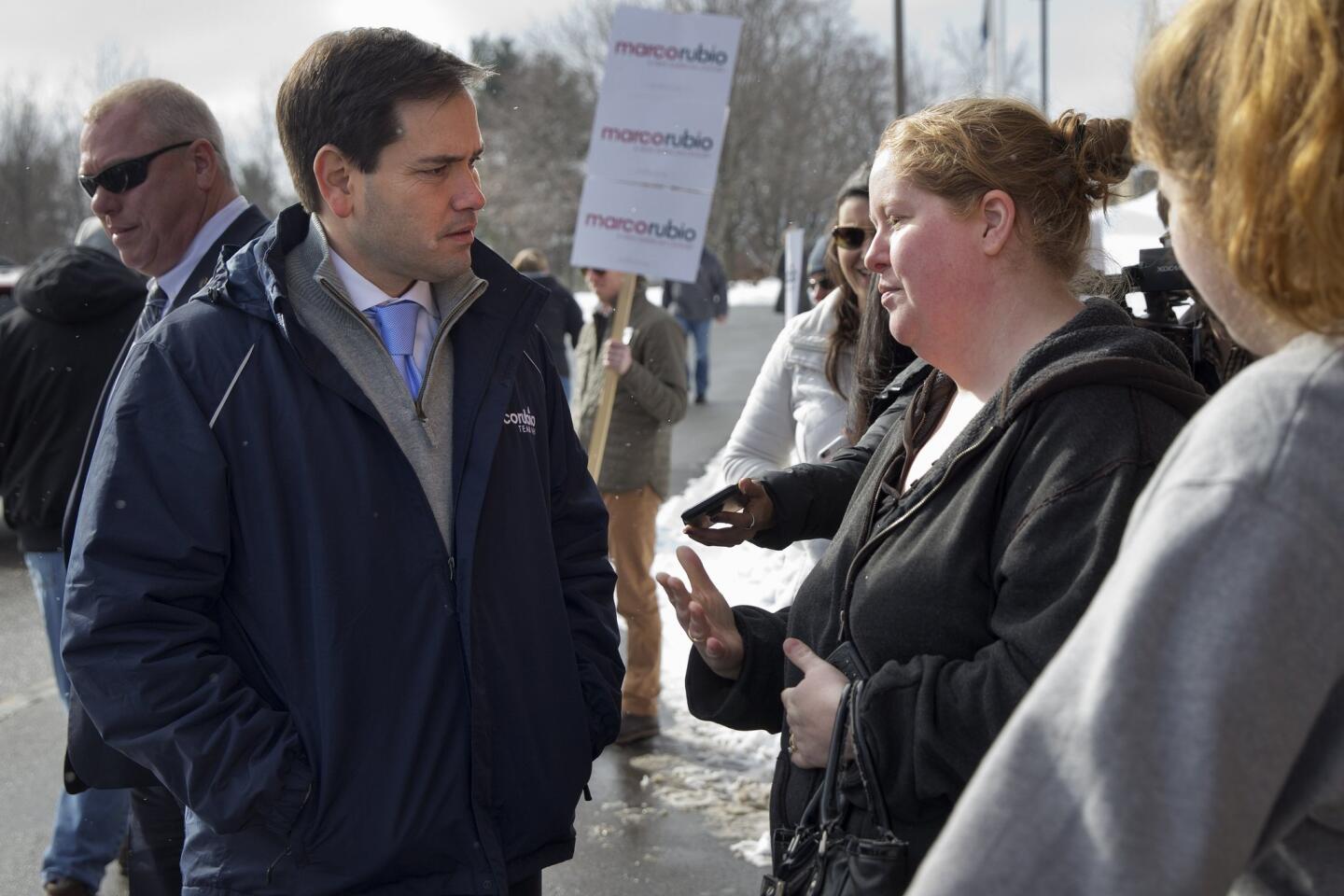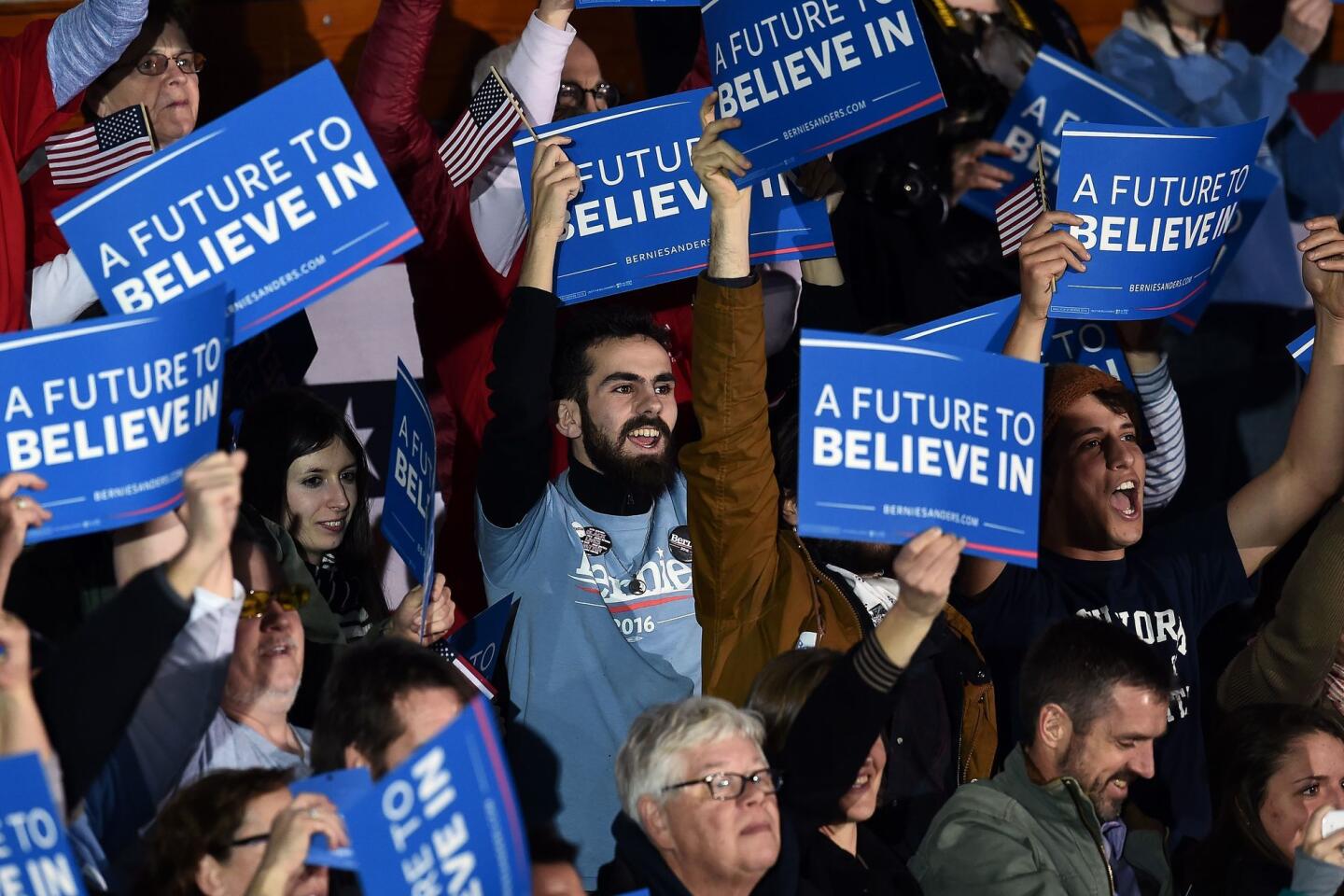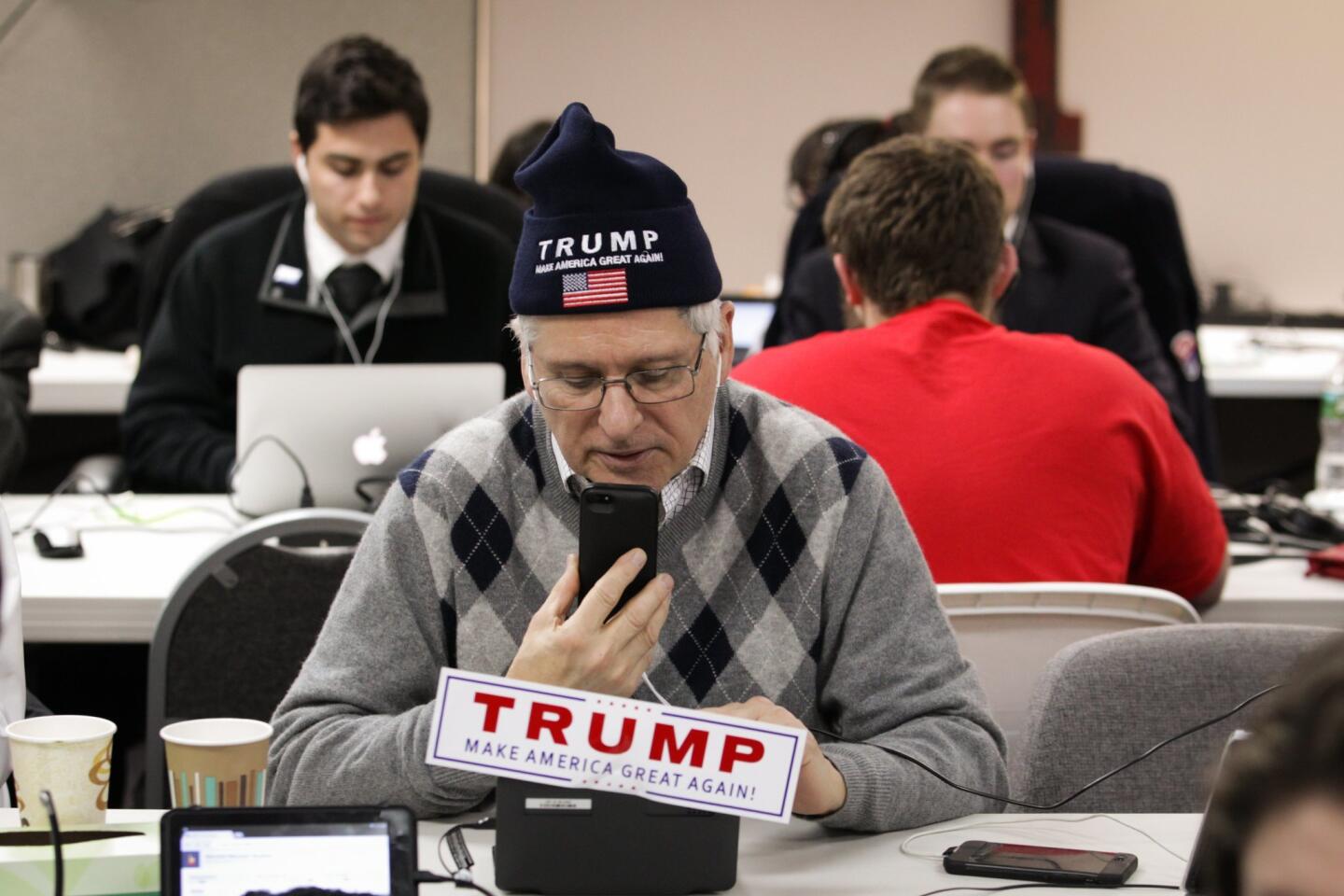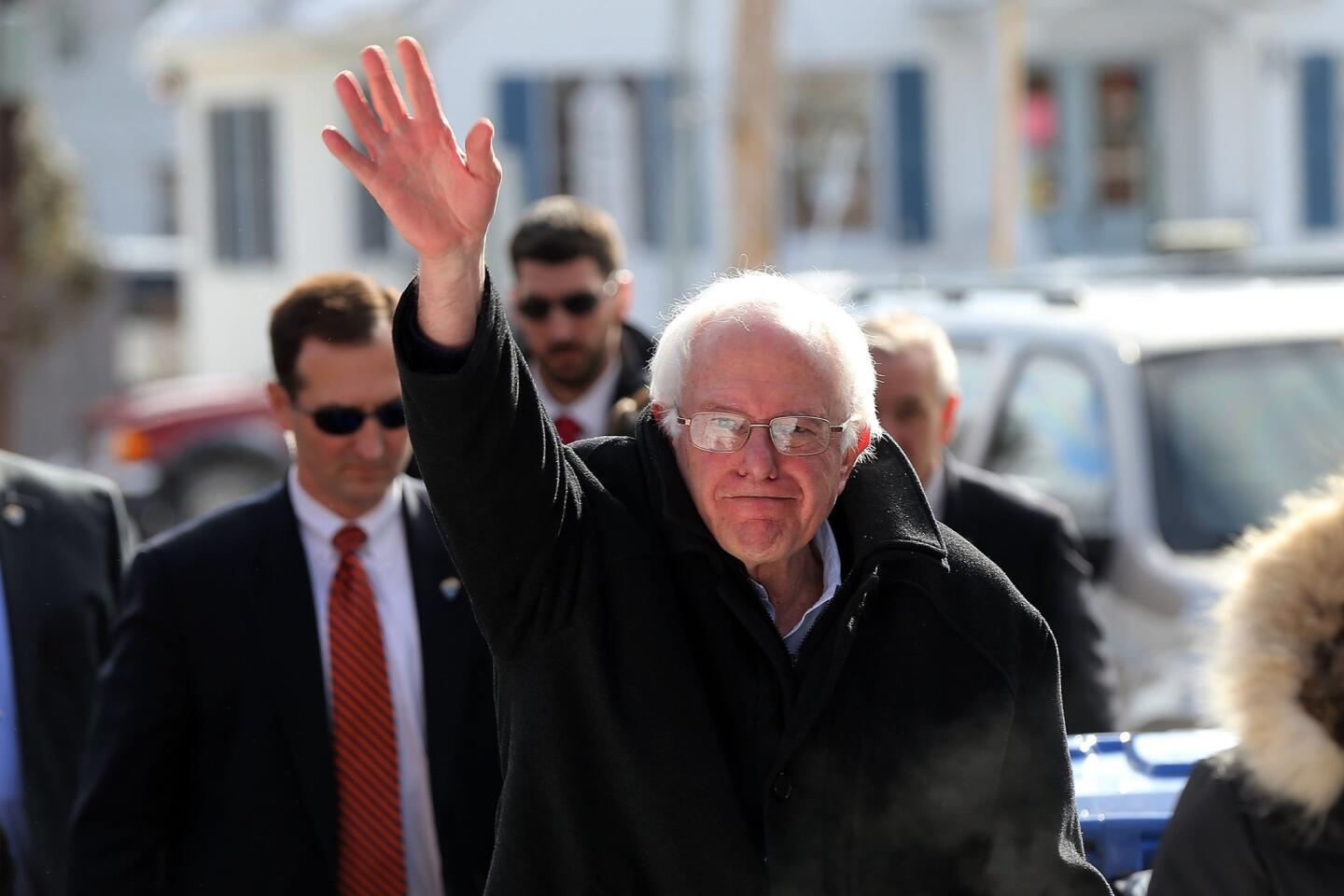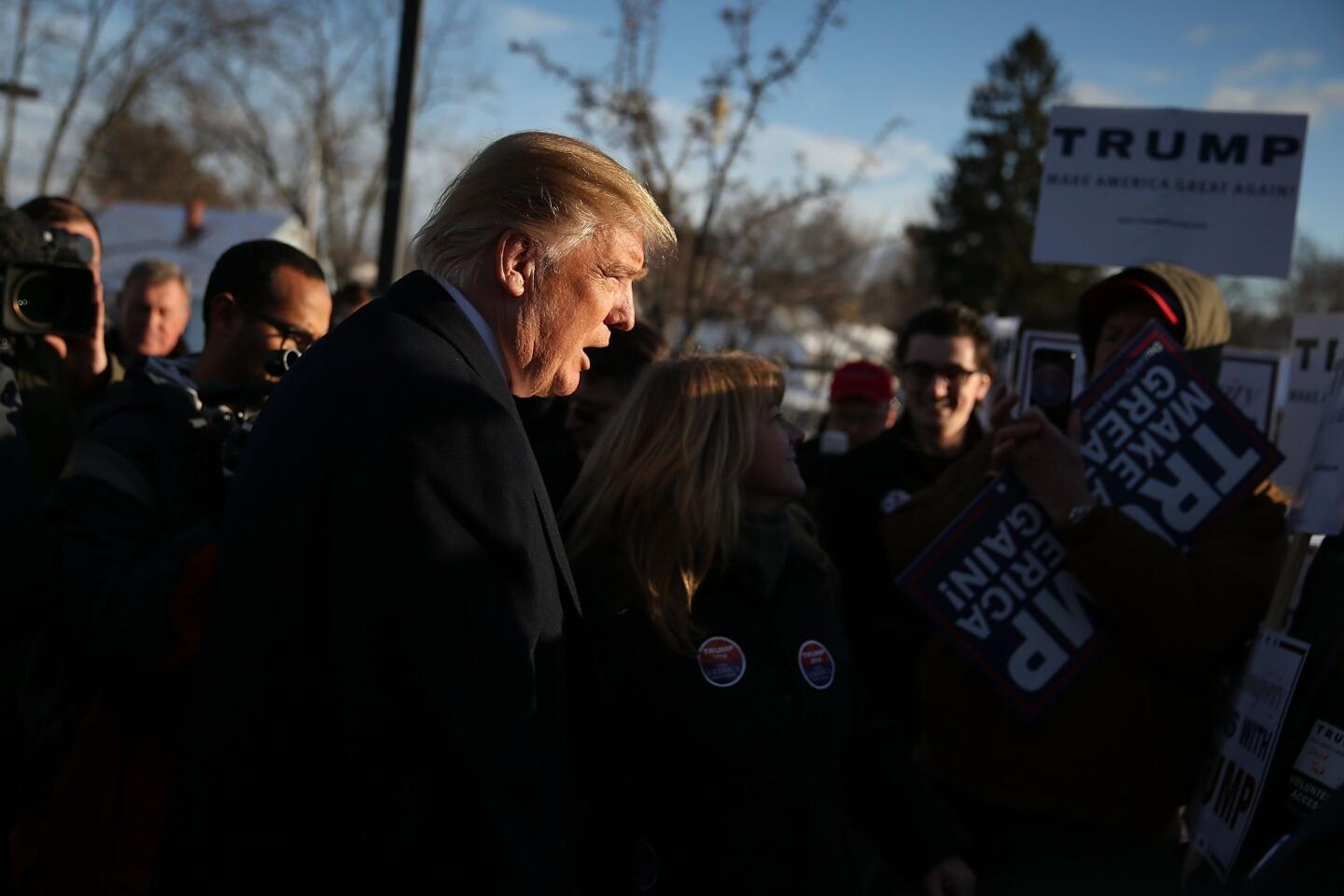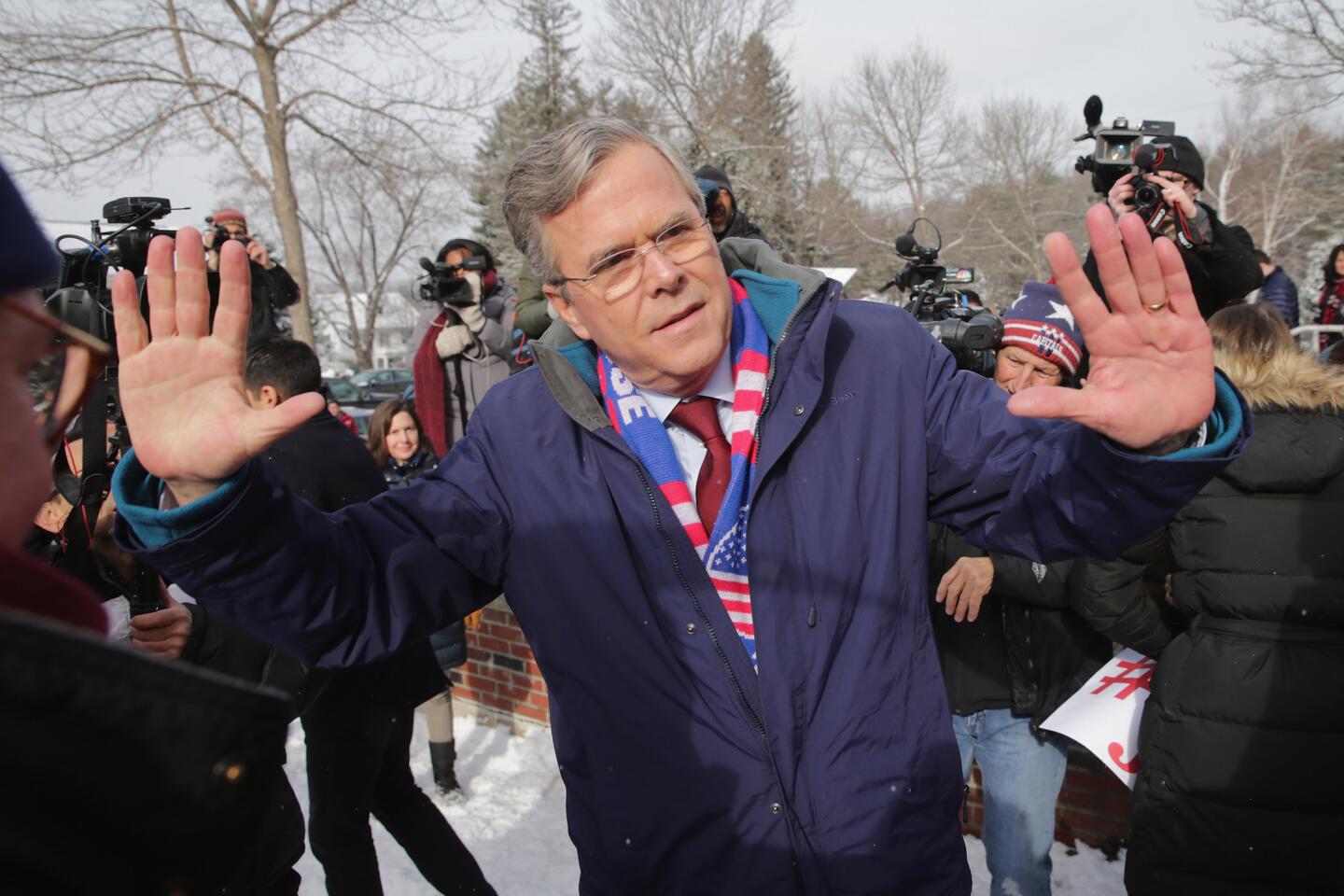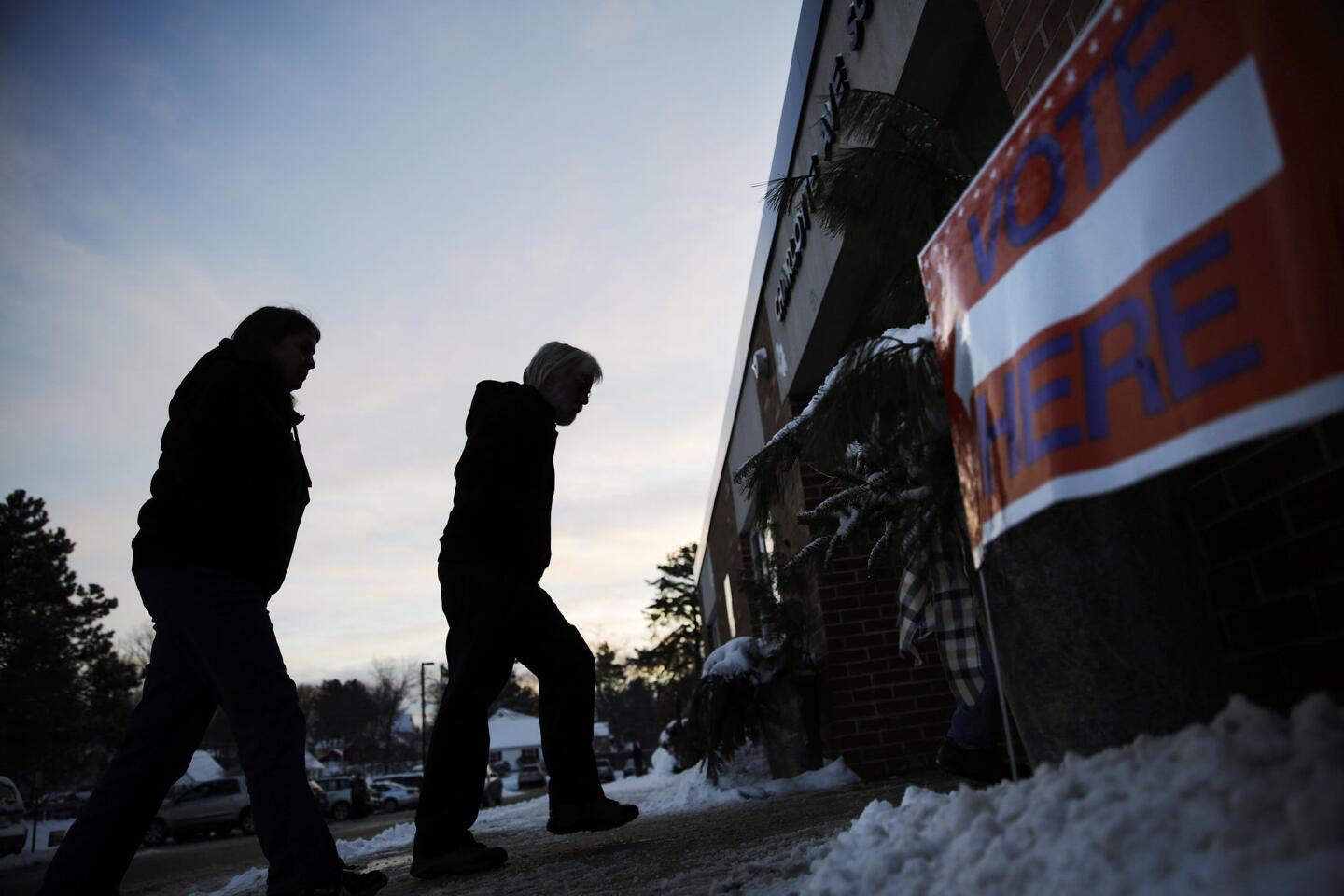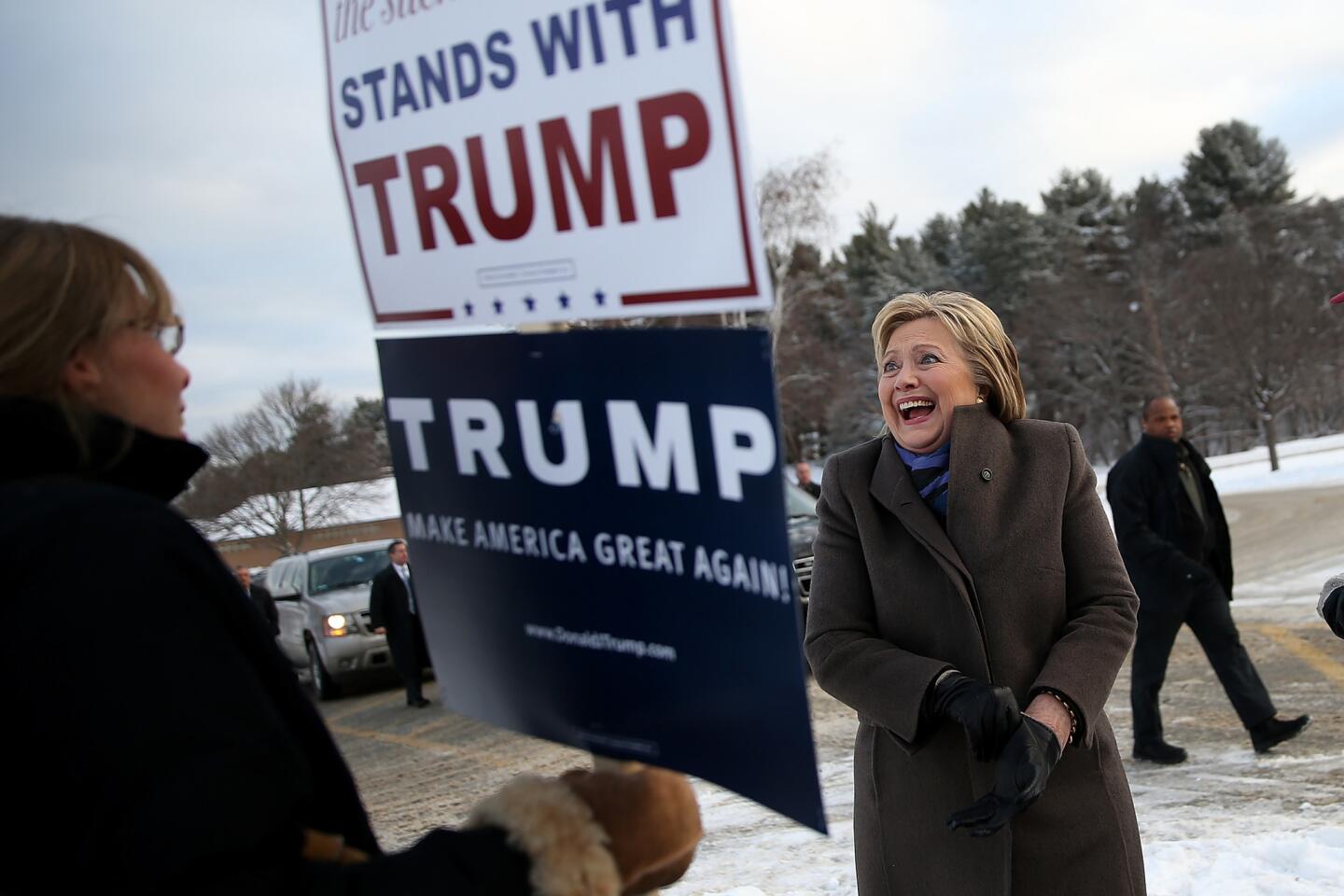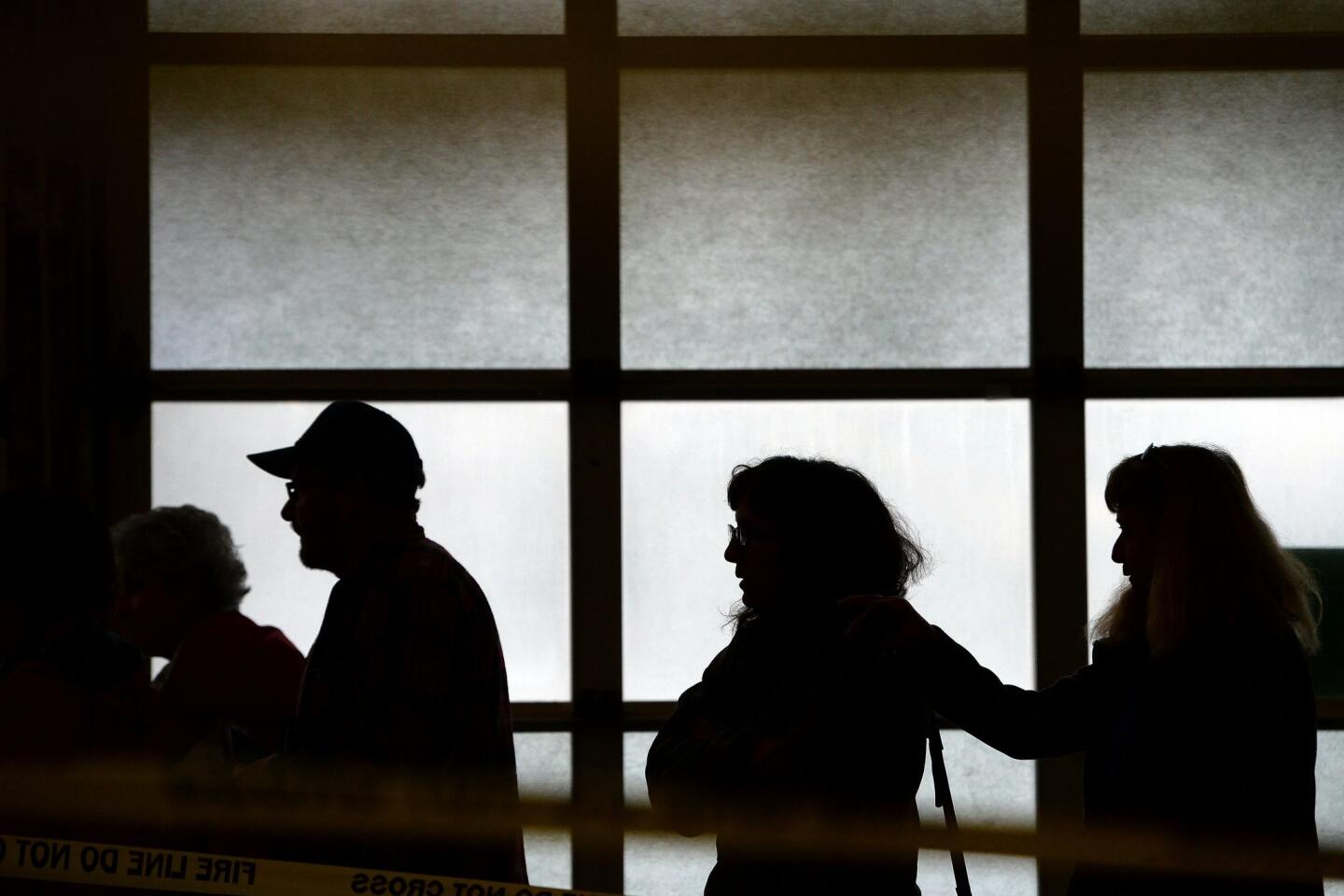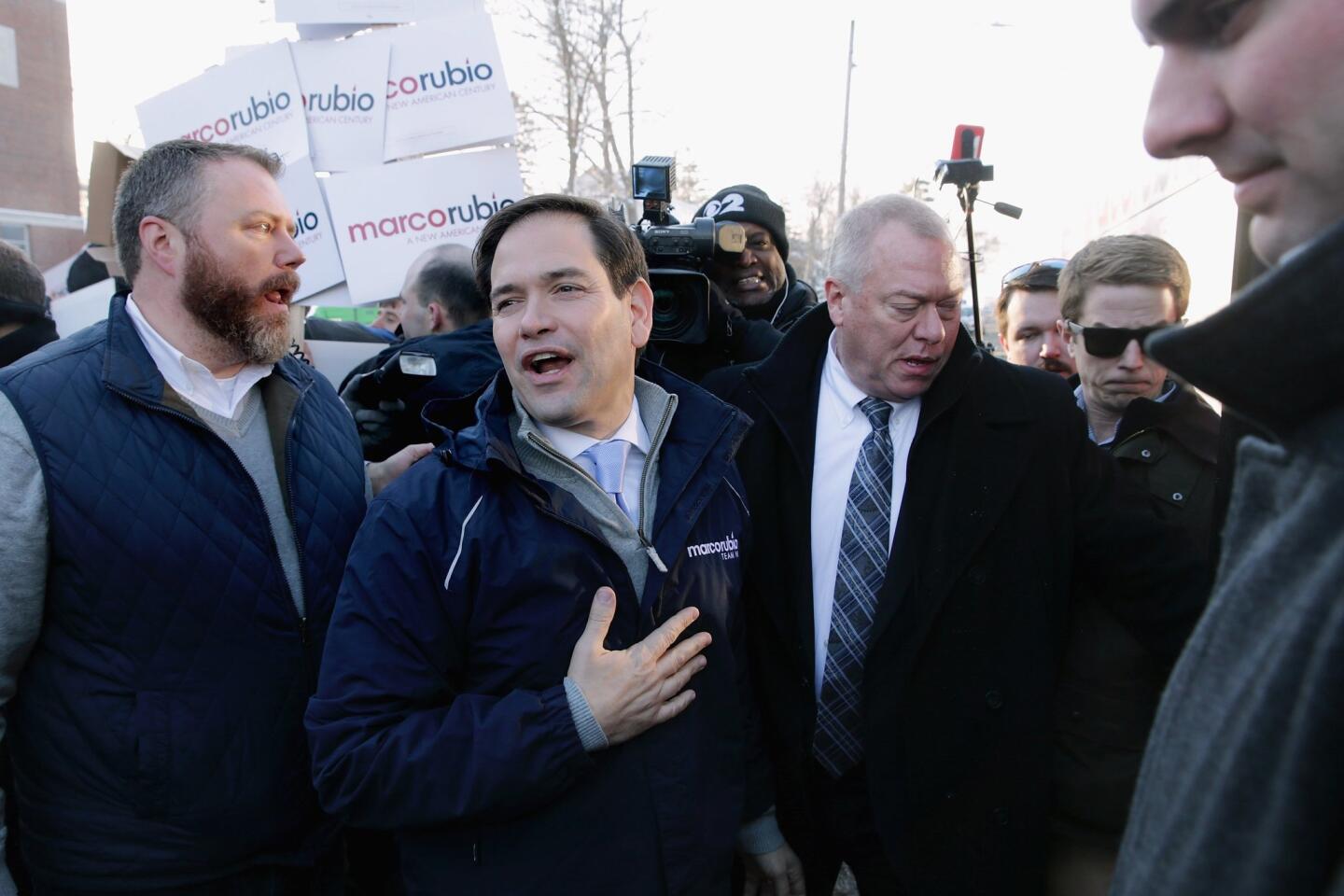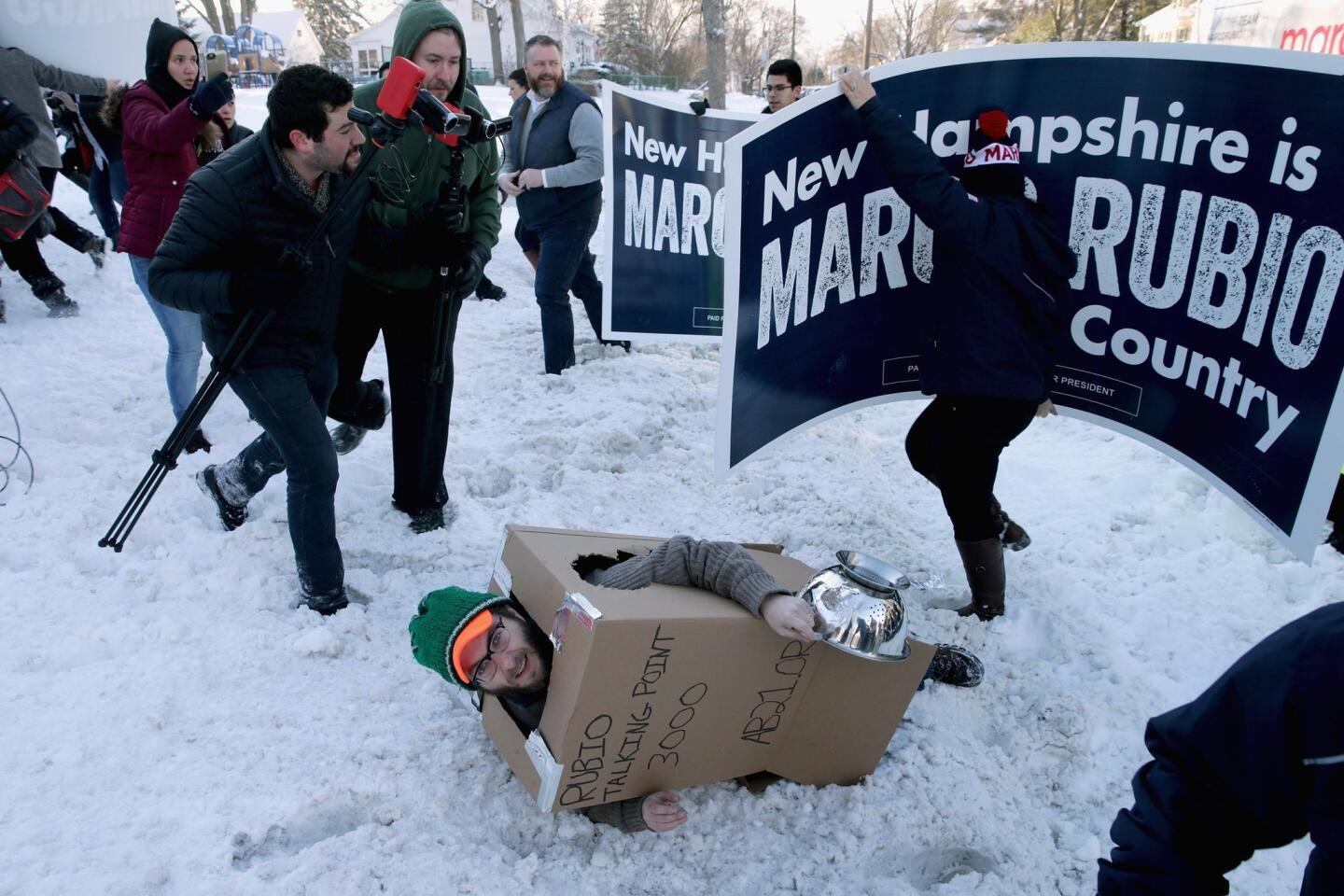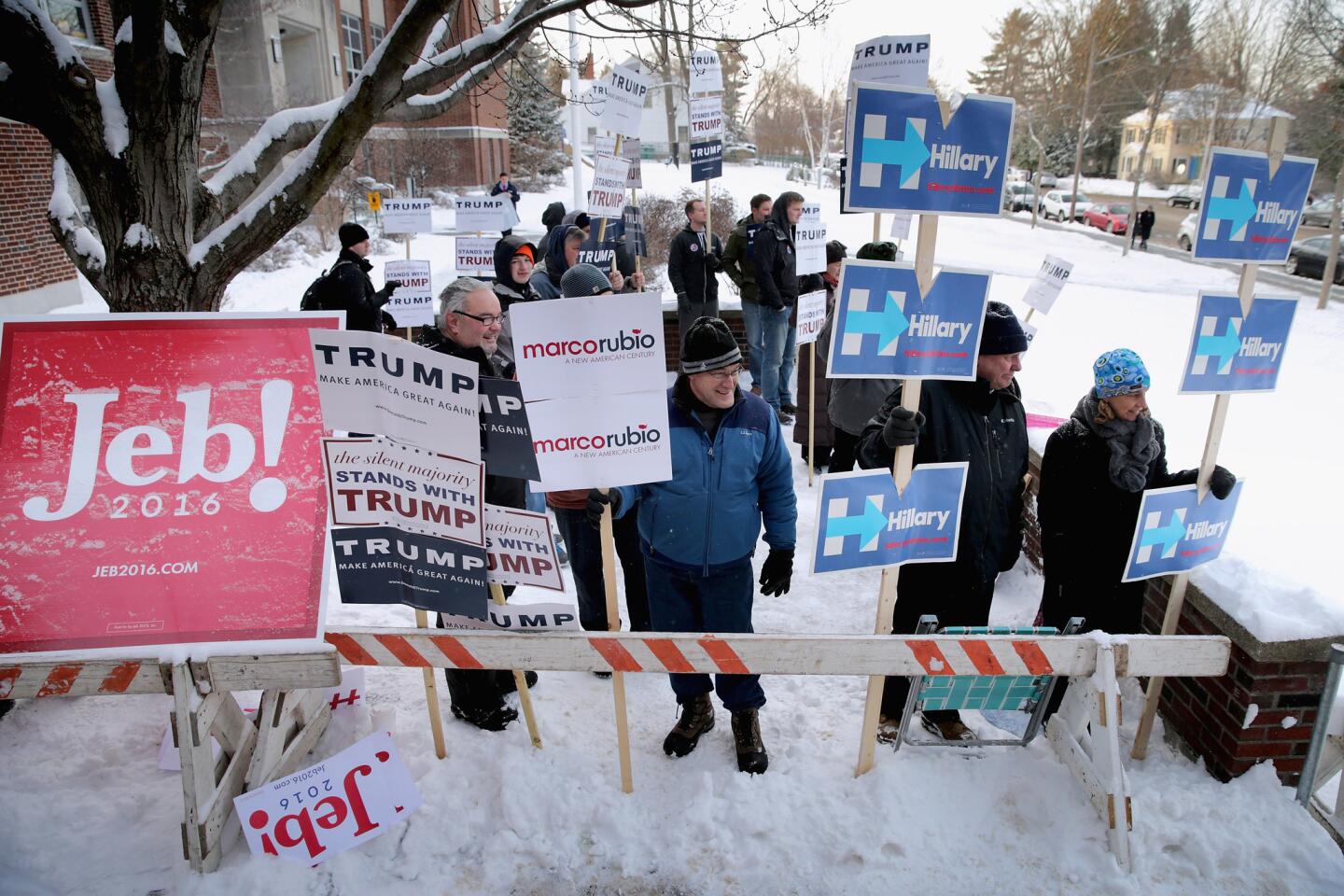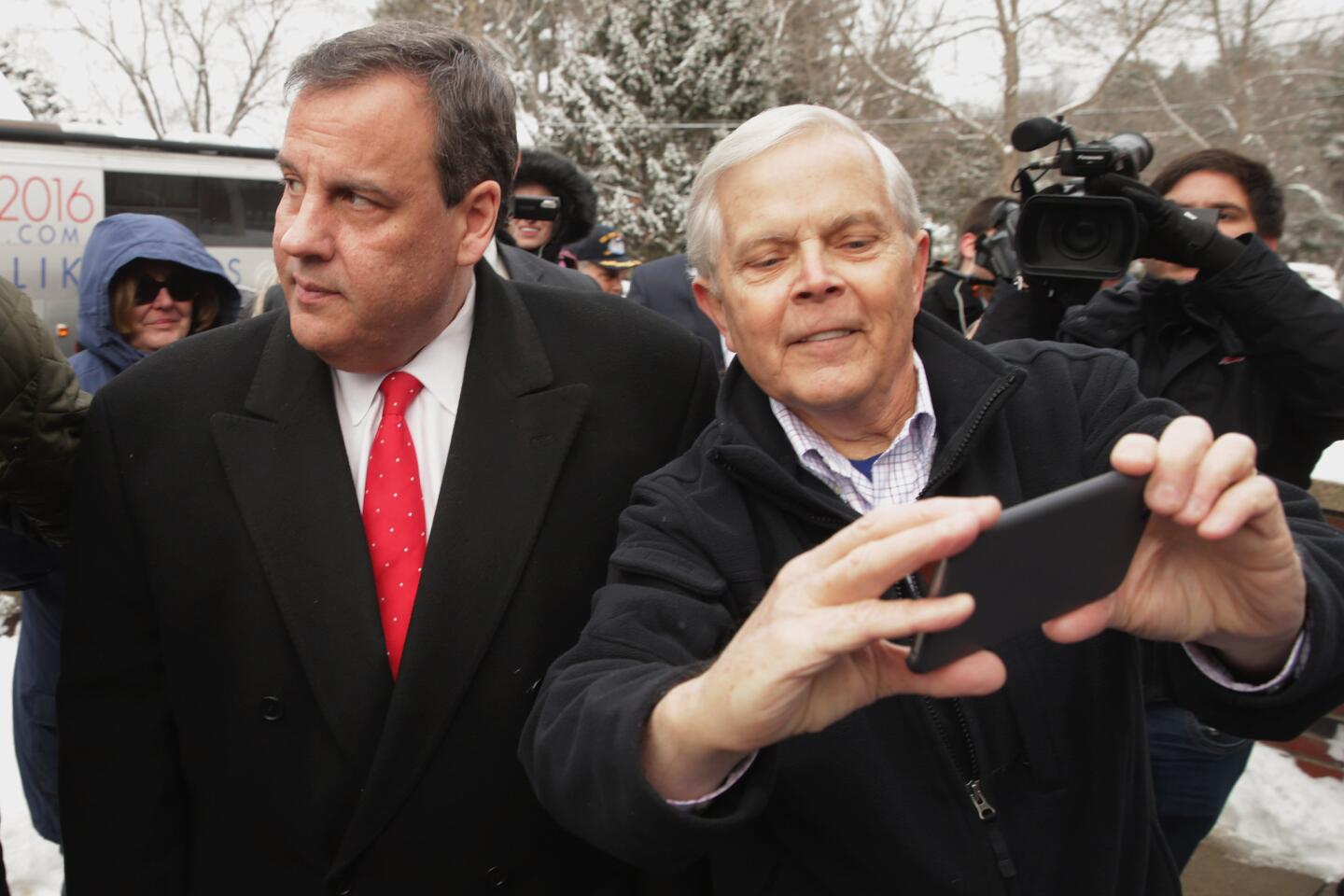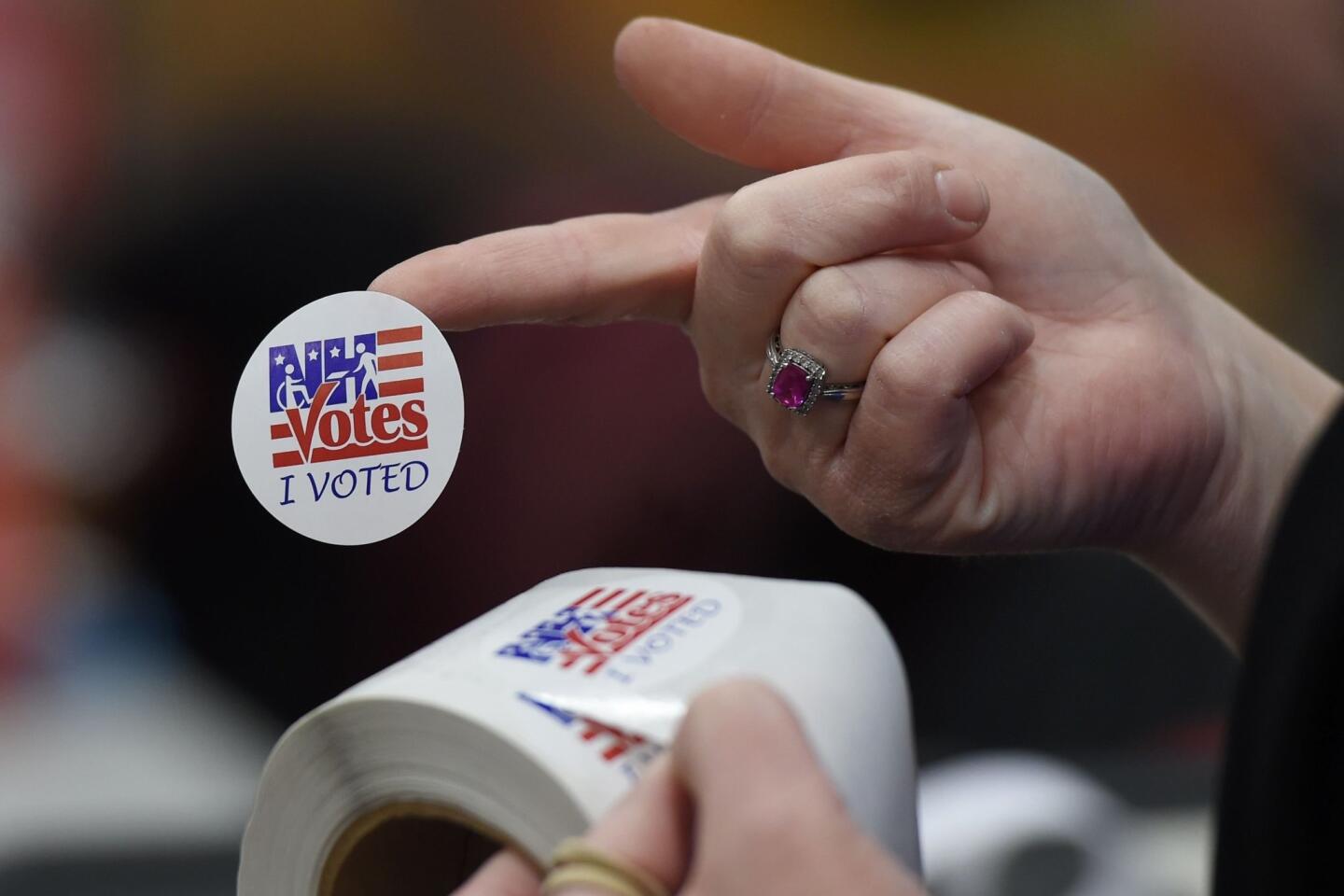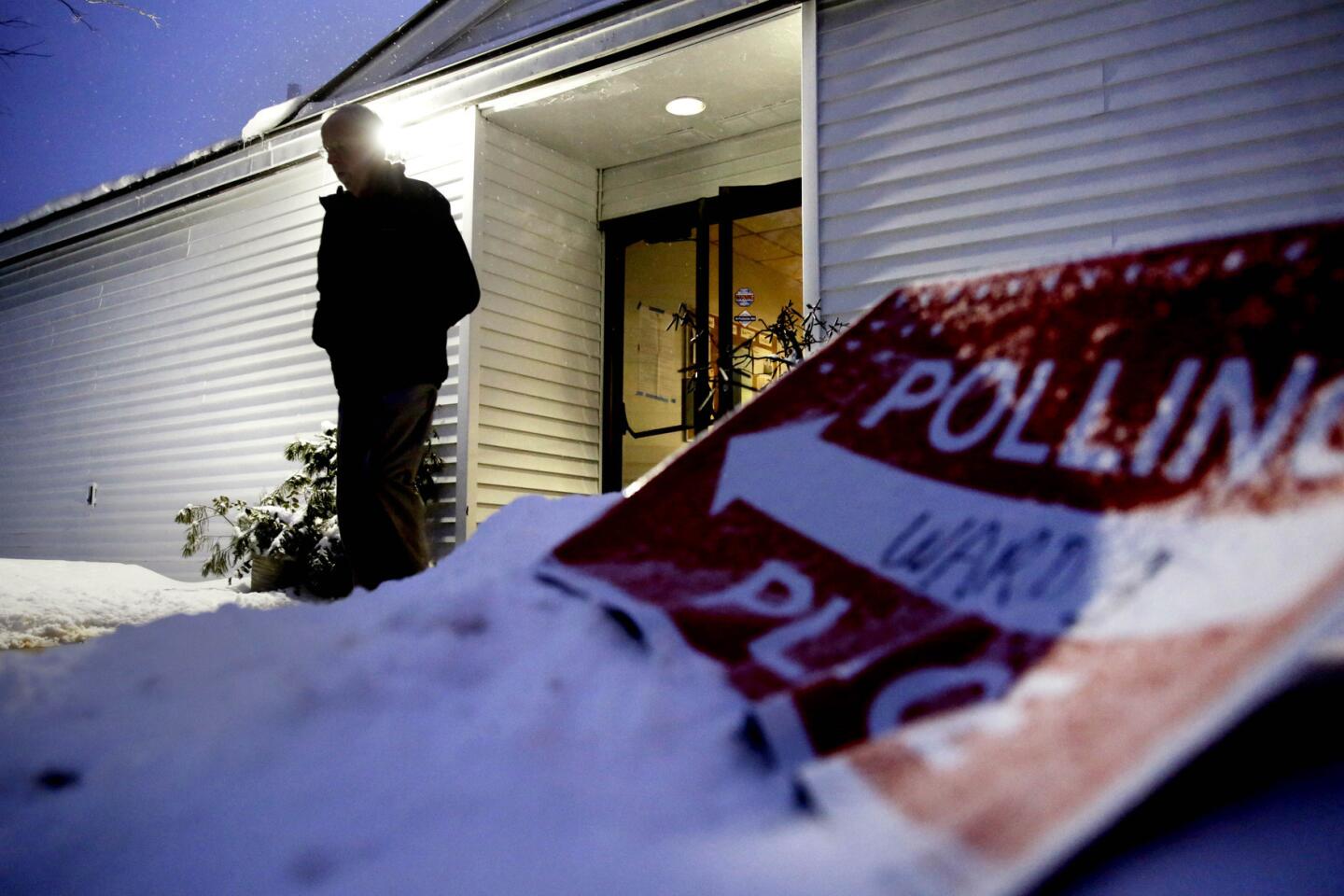With New Hampshire result, Trump is a serious contender, and Kasich is back in the race
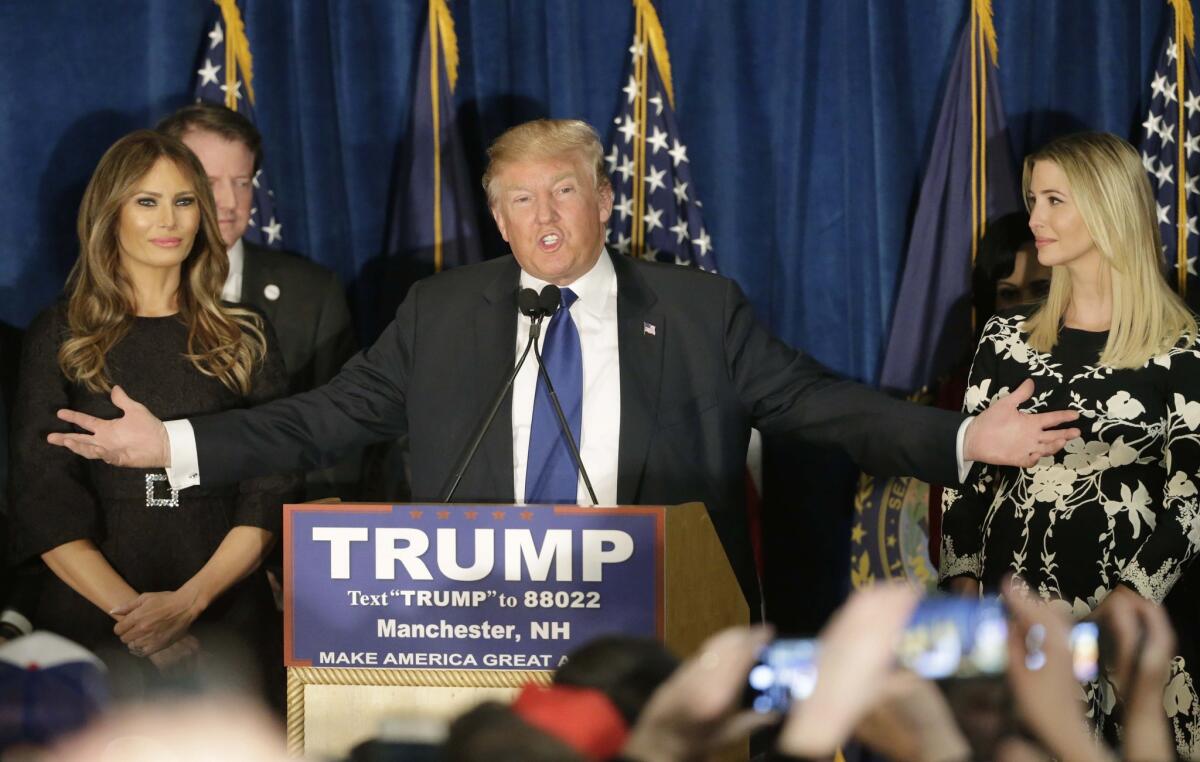
Republican presidential candidate Donald Trump speaks to supporters during a primary night rally in Manchester, N.H.
Reporting from Manchester, N.H. — With a commanding victory Tuesday in the New Hampshire primary, billionaire Donald Trump — the nightmare of the GOP establishment — has stamped himself as a serious contender for the Republican presidential nomination.
The question now is which candidate, or two, will be strong enough to stop him.
Ohio Gov. John Kasich, who’s been a speck in polls, finished second and achieved the breakout moment he was seeking in New Hampshire’s first-in-the-nation primary.
But far from clarifying the GOP race, the results — with Kasich and others bunched far behind Trump — further unsettled a contest that was already wide open and exceedingly unpredictable.
Trump was exuberant in victory, exclaiming to a rollicking crowd of hundreds of supporters in Manchester, “Oh, wow! Wow. Wow. Wow. So beautiful. So beautiful.”
“We are going to do something so good and so fast and so strong, and the world is going to respect us again,” he said. “Believe me.”
The crowd chanted over and over, “USA! USA! USA!” along with “Trump! Trump! Trump!”
But the mood among others in the Republican Party, especially many in Washington, was decidedly less celebratory. They point to Trump’s many offensive remarks targeting women, minorities and the handicapped, among others, and fear that nominating him will amount to political suicide come November.
Texas Sen. Ted Cruz, the winner of the Iowa caucuses, is also viewed with hostility by many in the GOP establishment, put off by his uncompromisingly conservative ideology and combative nature. They fret that placing him atop the fall ticket would result in major Republican losses up and down the ballot.
That leaves a scrum of candidates trying to emerge as the alternative to the front-runners, with the next fight less than two weeks away on Feb. 20 in South Carolina.
All of them will have to overcome significant liabilities before they emerge as serious contenders.
Kasich explicitly rejected the harsh tone and apocalyptic rhetoric of other Republican candidates — at least in his campaign appearances — an approach reflected in his buoyant victory speech. “The light overcame the darkness of negative campaigning, and you made it happen!” he said, pointing at different parts of the cheering crowd.
But Kasich has alienated many in his party by, among other moves, raising taxes at home and expanding access to healthcare under the Affordable Care Act — or Obamacare, as it is sometimes called.
Former Florida Gov. Jeb Bush, who was battling Cruz for third place, is fixed with his family name, once considered an asset but increasingly a burden at a time when Republican voters are rabid for change.
His relief at finishing in the middle of the New Hampshire pack was palpable. “This campaign is not dead,” he told happy supporters gathered at a community college in Manchester. “We’re going on to South Carolina.”
But finishing behind Kasich, who competes for many of the same more moderately conservative voters, could seriously handicap Bush’s campaign.
Florida Sen. Marco Rubio seemed ascendant after his surprisingly strong third-place finish in Iowa, but stumbled badly in Saturday night’s debate with a robotic performance that raised doubts about his youth — he is 44 — and preparedness to serve as president.
Rubio, in fifth place with 90% of the vote counted, apologized to supporters at a downbeat rally.
“Our disappointment tonight is not on you. It’s on me,” he said. “I did not do well on Saturday night. That will never happen again.”
New Jersey Gov. Chris Christie, who staked his entire campaign on a strong New Hampshire showing and led the assault against Rubio on the debate stage and after, was running near the bottom of the pack and seemed poised to quit the race. After his poor finish, he scrapped his schedule and said he was heading home.
“We are going to go home to New Jersey tomorrow, and we are going to take a deep breath, see what the final results are tonight, because that matters,” he told backers as his wife, Mary Pat, stood teary-eyed at his side.
The 23 delegates at stake in New Hampshire were a tiny fraction of the 1,237 needed to win the Republican nomination. The importance of the primary rests entirely on the momentum that attaches to the winner.
For Trump, the victory marked a turnabout after an unexpected second-place finish in Iowa and came despite his repeated defiance of political convention.
He largely shunned the up-close and personal campaigning that New Hampshire voters usually demand of candidates, staging big, boisterous rallies after touching down — then departing — in his lavish private jet.
He was proudly and loudly uncouth, even repeating a vulgarity shouted from the audience at an election eve appearance at Manchester’s sports arena.
To many, that did not matter.
Change-minded voters were less interested in niceties than shaking their fists at the status quo and sending a message to Washington and its political inhabitants.
Half the Republican voters interviewed in exit polls said they felt betrayed by their party leaders and nearly half said they preferred a political outsider to a candidate with experience in elected office.
But the road forward for Trump is hardly a smooth one. Apart from the resistance he faces from the party establishment, which has largely played to his benefit among unhappy voters, there is the unmovable reality of mathematics.
Though winning roughly a third of the vote was enough to handily carry New Hampshire, it won’t be enough to win future races if voters consolidate behind an alternative.
The candidate who presents perhaps the greatest puzzle is Rubio. After Iowa, he rose in polls and received a flood of contributions, suggesting he could be the candidate the party establishment rallies behind.
See more of our top stories on Facebook >>
He remains a highly gifted speaker with a compelling personal story — an immigrant family’s iteration of the American dream — and a primary victory could have essentially cleared the field of all save Trump and Cruz.
But that opportunity slipped away in Saturday night’s debate.
Now the Republican contest moves on, a relief to this battle-weary state.
Voters were buried in campaign mail and tens of millions of dollars in political advertisements; 18,000 TV commercials in all, according to the Boston Globe, including more than 2,500 just since Feb.1.
In the end, some of the most robust applause from New Hampshire audiences came when candidates noted the election — and “this pestilence,” as Cruz called it at a stop Monday in Manchester — would soon be over.
The fight in South Carolina, and after that Nevada, which holds its presidential caucuses three days later, will be shorter in duration. But it will be no less intense.
Twitter: @markbarabak
Times staffer writers Kurtis Lee and Seema Mehta in Los Angeles and Michael Finnegan in Manchester contributed to this report.
ALSO
New Hampshire relies on a mix of new and old voting systems
Editorial: Trump wins N.H. while the GOP establishment churns
Analysis: As a long race beckons, Tuesday winners Trump and Sanders face challenges
More to Read
Get the L.A. Times Politics newsletter
Deeply reported insights into legislation, politics and policy from Sacramento, Washington and beyond. In your inbox three times per week.
You may occasionally receive promotional content from the Los Angeles Times.

